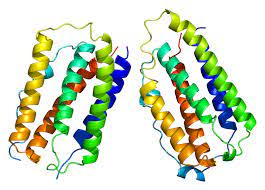What is IFNB1 Protein?
The Interferon Beta-1 (IFNB1) protein has an essential role in the human immune response against various pathogens. Since its discovery and subsequent rigorous study, its fundamental importance in the functioning of the human body and its potential in medical applications have become increasingly apparent.
Background and Discovery of IFNB1 Protein
In 1957, the IFNB1 protein was discovered concurrently by two independent teams of scientists, each investigating different viral infections. Both teams noted a new protein that was created by virus-infected cells and possessed antiviral abilities, hence the term interferon. This crucial protein has its gene, IFNB1, precisely assigned to the human chromosome 9, precisely at 9p21.1 gene locus.
What Is The Structure of IFNB1 Protein?
The structure of the IFNB1 protein comprises 166 amino acids and has a typical alpha/beta protein fold. Interestingly, owing to a lack of free cysteine, it exists as a non-covalent dimer and does not form disulfide bonds. Its configuration consists of five long alpha-helices and a series of shorter beta strands and loops.

(from Wikipedia)
What Is The Function of IFNB1 Protein?
Functionally, the IFNB1 protein is a part of a large group of interferons (IFNs), which are proteins known as cytokines. Cytokines are deployed by your immune system's cells to help mediate and regulate immunity, inflammation, and hematopoiesis. Specifically, IFNB1 is part of the Type I Interferons together with multiple forms of Interferon Alpha (IFNA) and a solitary Interferon Omega. These are known for their role in tackling viral infections, inhibiting tumor growth, and modulating the immune response.
Pivotal for IFNB1 function, the IFNB1 protein-related signal pathway activates the immune response pattern. When the Type I Interferon binds to its receptor on a cell's surface, it triggers a signaling cascade, activating numerous genes and generating an antiviral state. Notably, IFNB1 directly signals through the JAK/STAT pathway (Janus Kinase / Signal Transducer and Activator of Transcription), critical in cellular processes including cell growth, differentiation, apoptosis, immune response, and inflammation.
IFNB1 protein related diseases
Despite its immense value, irregularities and deficiencies in IFNB1 can lead to diseases. Mutations or malfunctions in the IFNB1 receptors can result in an inadequate cellular response, leading to heightened susceptibility to viral infections. Interestingly, IFNB1 protein is involved in the autoimmune disease, multiple sclerosis (MS). In MS, the immune system mistakenly attacks the protective covering of nerve fibers in the central nervous system. Research has shown that recombinant human IFNB1 protein administered as therapeutic interferon-beta is effective in reducing the relapse rate and slowing disease progression in relapsing-remitting multiple sclerosis.
IFNB1 protein's applications in biomedical
Beyond diseases, the IFNB1 protein holds substantial promise in biomedical applications. Its recognized role in inhibiting tumor growth offers potential in cancer treatment, specifically, some forms of breast cancer, melanoma, and lymphoma have shown sensitivity to human IFNB1. Researchers are also deploying the antiviral capability of IFNB1 to develop new medicines to treat viral infections like hepatitis and even the novel COVID-19.
In recent years, it has been observed that specific virus types can escape the antiviral effects of IFNs by varying mechanisms. Consequently, research is centered on enhancing the effective duration of IFN-associated antiviral immunity and mechanisms to overcome such viral IFN resistance.
In summary, the IFNB1 protein has deep-seated importance in antiviral immunity, anti-tumor activity, and disease progression moderation. Its versatility and influence within the immune system and beyond marks it as a focal point for ongoing research. Understanding and harnessing IFNB1's capabilities will not only improve our grasp of the immune system's intricacies but also present opportunities for therapeutic intervention in various diseases.
Our Featured Products
| Cat.No. | Product Name | Species | Source (Host) | Tag |
|---|---|---|---|---|
| IFNB1-243H | Recombinant Human IFNB1 Protein, His/GST-tagged | Human | E.coli | His/GST |
| IFNB1-08H | Recombinant Human IFNB1 protein | Human | E.coli | N/A |
| IFNB1-244H | Recombinant Human IFNB1 Protein, His-tagged | Human | E.coli | His |
| IFNB1-14H | Recombinant Human IFNB1, Fc tagged | Human | Human Cell | Fc |
| IFNB1-082H | Active Recombinant Human IFNB1 Protein | Human | E. coli | |
| IFNB1-574H | Recombinant Human IFNB1 protein, His-Avi-tagged | Human | HEK293 | His-Avi |
| IFNB1-4405R | Recombinant Rabbit IFNB1 Protein | Rabbit | Yeast | N/A |

